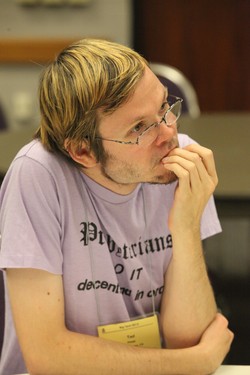Relationships, collaboration and education are key tools in community organizing, local leaders said at this morning’s (Aug. 3) Compassion, Peace and Justice Big Tent workshop — How to Turn Tables for Jesus: Community Organizing Training.
Big Tent, Aug. 1-3, is a celebration of Presbyterian Church (U.S.A.) mission and ministry organized around the theme “Putting God’s First Things First.” It’s composed of 10 national Presbyterian conferences, more than 160 workshops and special events to mark the 30th anniversary of the formation of the PC(USA) and the 25th anniversary of the opening of the Presbyterian Center here.
Community organizers, pastors, seminary students and local Presbyterians gathered to learn from three local leaders: Mikal Forbush, of the Muhammad Ali Institute for Peace and Justice; Anthony Smith, director for Safe Neighborhoods, Louisville Metro Government; and Ebony O’Rea, of the Network Center for Community Change.
Smith shared some of his philosophies for community organizing: reciprocity, relationships, collective impact and keeping in mind that the work we do today will impact future generations.
Also important is to recognize who is at the table and who is missing.
“We want to make sure that we’re always uncomfortable,” he said. “Because if we’re too comfortable, it means we’re not doing the work” of challenging race, class and power structures.
Participants then engaged in an exercise to challenge their comfort zones: Forbush instructed them to pair up with someone outside of their demographic, sit face to face with their knees nearly touching, look each other in the eye and alternate between talking and listening for three minutes at a time.
Developing relationships can be awkward at first, but it’s important to get over that awkwardness and learn who people really are, Forbush said.

